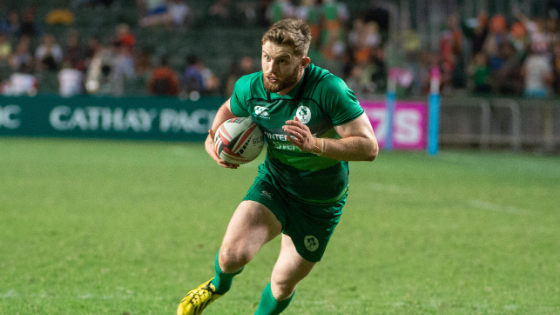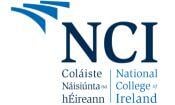
While rugby is a demanding sport, Ireland Men’s Sevens player Ian Fitzpatrick set himself another challenge; to gain a qualification in cybersecurity from National College of Ireland.
Ian has big goals in the sporting world having competed with the national team in the World Rugby Sevens Series and having took part in the Tokyo 2020 Olympic Games. When a shoulder injury meant that he couldn’t play for several months in 2019, Ian decided it was time to upskill as he realised that a rugby career doesn’t last forever. His research lead him to the Higher Diploma in Science in Computing (specialising in Cybersecurity) at NCI which is suitable for business graduates who do not have a technical background like Ian as it is designed to be a transition course for those interested in switching careers.
When results were announced, Ian shared the good news that he achieved a First Class Honours so we asked him to share his experience of the course, how he balanced studying with rugby and his advice for anyone considering furthering their education below.
1. Why did you decide to return to education last year?
When I left college after completing my undergraduate degree, I was unsure of what direction I wanted to take with my career outside of rugby. By chance, I was offered a part-time role in a small tech firm in Dublin and I worked two days a week for a year. It was during this time that I found my interest in technology growing even though I was on the commercial side of the business.

I made the decision to pursue a career in technology. After numerous conversations with fellow employees in the company, it was clear I needed to upskill myself to become a desirable candidate for a tech role. Up until this point in my life, I had a pure business background, so I began looking at different courses that would suit my needs.
Unfortunately, a rugby career doesn’t last forever! As a result of this, I was always conscious that as long as I was playing rugby, I would also continue my studies to ensure my transition out of rugby would be as smooth as possible.
Last summer, I underwent shoulder surgery that meant I would be unable to play for several months. I felt this was an excellent opportunity to return to education and when I came upon the Higher Diploma in Science in Computing (specialising in Cybersecurity) at NCI, I applied straight away.
2. Congratulations on being awarded a First Class Honours! Can you give us an insight into the course?
Before I began the course, I had two major concerns:
1) Would I be able to keep up with the content of the course as I had a non-technical background?
2) Secondly, this would be the first time I would be taking a course that was taught remotely. How will I adapt to working at home, and would I be able to fit my studies around my training schedule?
My first worry was quickly eased. Every lecturer emphasised that this course was for both technical and non-technical students. Each module worked through the basics and slowly introduced different concepts at a pace that suited the class. Even though students were not physically in the room, lecturers were more than happy to answer any questions that may come up.

Working remotely took some getting used to, but once I developed a routine, I really enjoyed it. Being able to go back through lectures and pause them if needed really was a game-changer!
In terms of the content of the course, I found it all very engaging. The first semester gives a general overview of computer science taught over a range of different modules. It's not until semester 2 that the course becomes more specialised with cybersecurity modules. Finally, a project is due in semester 3.
Once you get to semester 3, you can see there is a clear pathway for how the course is delivered. First, you are given a general overview of computer science. Then you learn about more specific cybersecurity topics. Lastly, you are expected to put together everything you have learned into developing an application of your choice (something I never thought would be possible).
3. How did you balance your studies with rugby and everything else in your life?
This was probably the most challenging part. Playing rugby, like most jobs, involves leaving the house early and getting home late. To help balance training, studying and other elements of my life, I found building a routine was the best thing to do.
However, even when you have the best intentions, life can sometimes get in the way and disrupt things. All the lecturers in NCI understood this and were more than happy to help if I had any issues.
4. What are your future career plans?
At the moment, I am weighing up my options. Ideally, it would be great to get some experience in the cybersecurity world so I can put what I have learned into practice.
I am also hoping to secure Olympic qualification this year with the Irish 7s team, but I will definitely be pursuing a career path into technology alongside my rugby career.
5. Finally, what advice would you give to anyone considering returning to education?
Do it! If you’re interested in upskilling yourself or a complete career change, I could not recommend it enough. I never imaged myself completing a course like this a year ago and I am delighted that I did.
Ian studied the Higher Diploma in Computing (specialising in Cybersecurity) at NCI. The course is suitable for both technical and non-technical professionals who would like to upgrade their skills.










